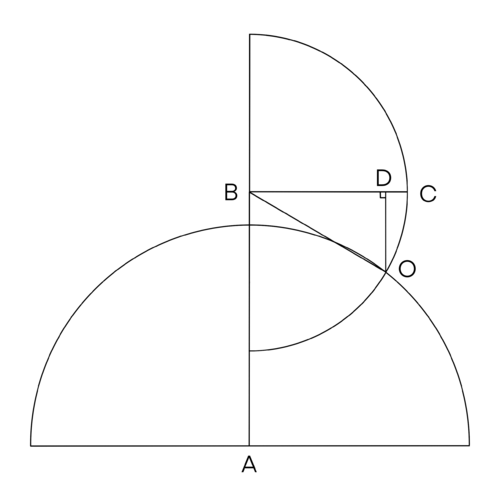2003 AMC 12B Problems/Problem 21
Problem
An object moves ![]() cm in a straight line from
cm in a straight line from ![]() to
to ![]() , turns at an angle
, turns at an angle ![]() , measured in radians and chosen at random from the interval
, measured in radians and chosen at random from the interval ![]() , and moves
, and moves ![]() cm in a straight line to
cm in a straight line to ![]() . What is the probability that
. What is the probability that ![]() ?
?
![]()
Solution 1 (Trigonometry)
By the Law of Cosines,

It follows that ![]() , and the probability is
, and the probability is ![]() .
.
Solution 2
![]() , let the object turn clockwise.
, let the object turn clockwise.
Note that the possible points of ![]() create a semi-circle of radius
create a semi-circle of radius ![]() and center
and center ![]() . The area where
. The area where ![]() is enclosed by a circle of radius
is enclosed by a circle of radius ![]() and center
and center ![]() . The probability that
. The probability that ![]() is $$ (Error compiling LaTeX. Unknown error_msg)\frac{\angle ABO}{180 ^\circ}$.
is $$ (Error compiling LaTeX. Unknown error_msg)\frac{\angle ABO}{180 ^\circ}$.
Let$ (Error compiling LaTeX. Unknown error_msg)B = (0, 0)![]() \odot B = x^2 + y^2 = 25
\odot B = x^2 + y^2 = 25![]() \odot A = x^2 + (y+8)^2 = 49
\odot A = x^2 + (y+8)^2 = 49![]() O
O![]() x^2 + (y+8)^2 - x^2 - y^2 = 49 - 25
x^2 + (y+8)^2 - x^2 - y^2 = 49 - 25![]() 64 + 16y =24
64 + 16y =24![]() y = - \frac52
y = - \frac52![]() x = \frac{5 \sqrt{3}}{2}
x = \frac{5 \sqrt{3}}{2}![]() O = (\frac{5 \sqrt{3}}{2}, - \frac52)
O = (\frac{5 \sqrt{3}}{2}, - \frac52)![]() \triangle BDO
\triangle BDO![]() 30-60-90
30-60-90![]() BO = 5
BO = 5![]() BD = \frac{5 \sqrt{3}}{2}
BD = \frac{5 \sqrt{3}}{2}![]() DO = \frac52
DO = \frac52![]() \angle CBO = 30 ^\circ
\angle CBO = 30 ^\circ![]() \angle ABO = 60 ^\circ$.
\angle ABO = 60 ^\circ$.
Therefore the probability that$ (Error compiling LaTeX. Unknown error_msg)AC < 7![]() \frac{\angle ABO}{180 ^\circ} = \frac{60 ^\circ}{180 ^\circ} = \boxed{\textbf{(D) } \frac13 }$
\frac{\angle ABO}{180 ^\circ} = \frac{60 ^\circ}{180 ^\circ} = \boxed{\textbf{(D) } \frac13 }$
See also
| 2003 AMC 12B (Problems • Answer Key • Resources) | |
| Preceded by Problem 20 |
Followed by Problem 22 |
| 1 • 2 • 3 • 4 • 5 • 6 • 7 • 8 • 9 • 10 • 11 • 12 • 13 • 14 • 15 • 16 • 17 • 18 • 19 • 20 • 21 • 22 • 23 • 24 • 25 | |
| All AMC 12 Problems and Solutions | |
The problems on this page are copyrighted by the Mathematical Association of America's American Mathematics Competitions. 










